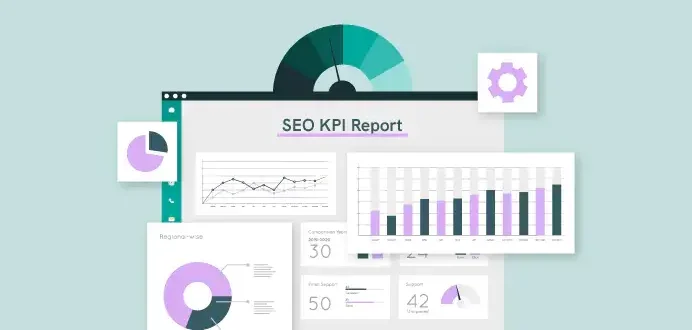
Introduction:
Understanding SEO metrics and KPIs (Key Performance Indicators) is essential for measuring the success of any digital marketing strategy. These metrics provide insights into how well a website is performing in search engine results and how effectively it is attracting organic traffic. Key SEO metrics include organic search traffic, keyword rankings, click-through rates (CTR), bounce rates, and conversion rates. By analyzing these data points, businesses can identify areas for improvement, optimize their content, and refine their strategies. Monitoring KPIs helps marketers connect SEO activities with larger business objectives. Ultimately, a strong understanding of SEO metrics is crucial for driving growth and staying competitive in the digital landscape.
What Are SEO Metrics and KPIs?
In the world of digital marketing, SEO (Search Engine Optimization) is a critical factor in driving traffic and improving visibility on search engines like Google. However, to truly understand the effectiveness of your SEO strategy, it’s essential to track and measure specific indicators—these are known as SEO metrics and KPIs (Key Performance Indicators). These data points provide valuable insights into how well your website is performing and help guide future optimization efforts.
SEO Metrics: What Are They?
SEO metrics are numerical indicators that evaluate different facets of your website’s performance on search engines. These can include:
Organic Traffic: The number of visitors arriving at your site from search engine results, excluding paid ads. More organic traffic typically indicates a stronger SEO performance.
Keyword Rankings: These refer to the positions your targeted keywords hold on search engine results pages (SERPs). Improved rankings typically result in greater visibility and a boost in traffic.
Bounce Rate: The proportion of visitors who exit your website after viewing just a single page. A high bounce rate may indicate that your content or website experience needs improvement.
Click-Through Rate (CTR): This measures the percentage of users who click on your website’s link after seeing it in the search results. A higher CTR indicates that your meta titles and descriptions effectively capture attention and drive clicks.
How to Use SEO KPIs Effectively
SEO KPIs (Key Performance Indicators) are essential tools for measuring the success of your SEO efforts. They help you align your strategy with business goals, monitor progress, and make data-driven decisions. To use SEO KPIs effectively, consider the following steps:
1. Set Clear and Relevant KPIs:
Start by defining KPIs that directly align with your business objectives. For example, if your goal is to increase sales, focus on KPIs like conversion rates, organic traffic, and keyword rankings for transactional keywords. If brand awareness is your goal, track metrics like organic traffic and impressions.
2. Monitor Progress Regularly:
SEO is a long-term strategy, and changes often take time to reflect in KPIs. However, tracking your KPIs on a regular basis (weekly or monthly) allows you to understand how your SEO efforts are paying off. Use analytics tools like Google Analytics, Google Search Console, or third-party SEO platforms to track your progress.
3. Focus on Actionable Data:
KPIs should provide insights you can act on. For example, if you notice a drop in organic traffic, delve deeper into which pages or keywords are underperforming. This allows you to make informed adjustments to your content, keywords, or technical SEO.
4. Analyze Trends, Not Just Numbers:
While individual KPIs are important, looking at long-term trends helps you make more strategic decisions. For instance, a gradual increase in conversion rates over time may indicate that your SEO strategy is effectively driving more targeted traffic. Monitoring trends gives you a clearer picture of your strategy’s overall impact.
5. Compare Performance with Industry Benchmarks:
Benchmarking your KPIs against industry standards or competitors can give you a sense of whether your performance is on track. Comparing your keyword rankings, organic traffic, or bounce rate with others in your industry can help identify strengths and weaknesses.
6. Adjust Your Strategy Based on KPI Insights:
Effective use of KPIs requires agility. If your KPIs show that your site is experiencing high bounce rates or low conversion rates, it’s time to review your content, user experience, or call-to-action strategies. Regularly adjust your SEO approach based on the insights KPIs provide.
7. Tie KPIs to ROI:
Ultimately, SEO should contribute to your business growth. By tracking KPIs that lead to conversions, sales, or lead generation, you can tie SEO efforts back to return on investment (ROI). If your KPIs show positive results in these areas, you can justify the value of your SEO strategy and resources spent.
Conclusion:
Understanding and leveraging SEO metrics and KPIs is pivotal for digital success. By focusing on the right metrics, aligning them with your goals, and optimizing strategies based on data, you can ensure sustainable growth. Start tracking today and unlock your website’s full potential!
Also Read: Advanced SEO Techniques for Growth
